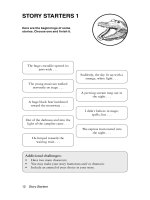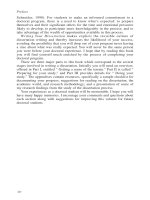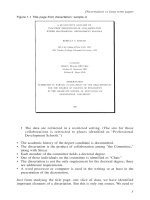Writing your doctoral dissertation - part 3 doc
Bạn đang xem bản rút gọn của tài liệu. Xem và tải ngay bản đầy đủ của tài liệu tại đây (170.08 KB, 5 trang )
Dissertation vs long term paper
5
• The data are collected in a restricted setting. (The site for these
collaborations is restricted to places identified as “Professional
Development Schools.”)
• The academic history of the degree candidate is documented.
• The dissertation is the product of collaboration among “the Committee,”
along with Strear.
• Each member of the committee holds a doctoral degree.
• One of these individuals on the committee is identified as “Chair.”
• The dissertation is not the only requirement for the doctoral degree; there
are additional requirements.
• A word processor or computer is used in the writing or at least in the
presentation of the dissertation.
Just from studying the title page, one slice of data, we have identified
important elements of a dissertation. But this is only one source. We need to
Figure 1.1 Title page from dissertation: sample A
Dissertation vs long term paper
6
compare this with other data before we make any hasty generalizations or
assumptions. And so, let’s look at another title page from a dissertation
completed at a different university, as presented in Figure 1.2.
We can compare Figures 1.1 and 1.2. They both have lengthy, descriptive
titles, names of committee members, and a statement about the “partial
fulfillment of requirements” for a degree. They both have a formal,
professional presentation style. On some level they look fairly similar, with
relatively minor variations. Jot down any additional information you can infer
about dissertations from these two samples before reading my interpretation.
Combining our insights from samples A and B, we know that:
• these are title pages from dissertations, not dissertation proposals or term
papers;
• dissertations may use different research methodologies; and
Figure 1.2 Title page from dissertation: sample B
Dissertation vs long term paper
7
• the style of the presentation suggests a required format rather than a unique
one created by each individual student.
There are also several contrasts, some of which might indicate subtle
differences in the relationship between the student and the committee. These
nuances may have little import for you, or they may suggest a specific stance
which you should consider adopting in your conversations with your
committee, for example.
• The role of the committee is not clear. In sample A the committee members
are listed below the student’s name, implying that they supported the student’s
work, whereas in sample B the positioning of the committee on the top of the
page may suggest that the committee directed the dissertation.
• The prominence of the student’s name differs: in sample A the doctoral
student’s name is all in upper case letters, equivalent to the emphasis given
to the title of the dissertation. In sample B the name appears in upper and
lower case letters, similar to the listing for the committee.
• In one institution, the doctoral degrees (EdD or PhD) held by the
committee members are noted, whereas the other institution seems to
emphasize the fact that the committee is comprised of professors.
• Only in sample A is there a notation of the degrees previously awarded to
the doctoral candidate.
These sample title pages offer us an initial sense of the many issues involved
in writing a dissertation.
Writing a Term Paper
In writing your term papers, you followed what your professor directed you
to do, in the main. Your professors monitored your pace. Many, if not all, of
the sources which you referred to in your paper were suggested by your
professor. The topic of your paper was probably predetermined by your
professor and you had a deadline to meet. Your term paper usually comprised
one element in a total evaluation of your work in the course, eventually
resulting in the professor entering a grade with the registrar which indicated
that you had successfully completed the course. Whether you received a
grade of B or A may have been the most important outcome for you. For
most, the completion of that requirement yielded great relief and satisfaction.
Few concerned themselves with making sense of the course in the context of
their other studies.
At this time we have sufficient information to document our growing
understanding of some of the differences and similarities between term papers
and dissertations. In addition to the insights we have developed from these
brief analyses, there are several other related issues which become
noteworthy in our comparison.
Dissertation vs long term paper
8
• When writing a dissertation, you are expected to “break some new
ground.” You are expected to contribute to the evolving knowledge base
of a discipline through your dissertation. In a term paper you may explore
some areas in depth; there is little need to determine if others have gone
this route before. In fact, everyone in your class may be writing on the
same topic. In writing your dissertation, you conduct an intensive data
search, insuring that the project you are mounting is different from what
has “already been done.” You will bring a new perspective. You will study
with new lenses, becoming aware of different phenomena. Your study will
contribute to the expanding literature in your field.
• When you write a term paper, you are aware of a professor’s biases and
you probably deal with these in the writing of your paper. When writing
your dissertation you have many more readers of your work—potentially
readers with different, conflicting theoretical orientations. It will be
essential for you to deal with this potential conflict, discussing competing
theories and ideas. Ultimately, your interpretation of your data will need
to reflect an understanding of multiple viewpoints.
• In contrast to your term papers, which probably drew on sources
recommended by your professor, your dissertation will reflect your
resourcefulness at identifying pertinent sources. In fact, in the process of
writing your dissertation, you become the expert, in contrast to your term
papers where your professor typically was more knowledgeable than you
on the topic.
• A term paper is returned to the student, with no record of that paper
remaining at the institution. Certainly it is not freely available to those
within and outside the university. Your dissertation, however, will be
available to the entire academic community through Dissertation Abstracts
International and through Interlibrary loan, for example.
• It is very important to acknowledge that your relationships with the
members of your dissertation committee will influence the progress you
make. While a course has a fixed conclusion date, your dissertation does
not.
• When writing term papers, you wrote independently. Writing your
dissertation requires collaboration with your committee.
• A term paper is a one-shot deal, usually. You turn in the paper, it is read
and evaluated, and sometimes returned with a grade and/or comments.
With a dissertation, typically there are numerous drafts. No longer is it
acceptable to get a passing grade or helpful comments. Now you need to
respond to those comments. These remarks and questions become
directions for improving your text, as well as guidelines for future drafts
and future parts of your dissertation. Your dissertation is a work in
progress. Your committee’s input seeks to promote the possibility of
attaining some level of perfection.
• In contrast to a term paper, which usually must be completed within the
time-frame of a one-semester course, your dissertation has no such time
limits. One of the distinguishing characteristics of a dissertation is that it
Dissertation vs long term paper
9
goes through multiple drafts before it finally receives the approval of the
committee. In fact, frequently there is a “dissertation proposal,” which
needs to be approved prior to the initiation of the dissertation research
project. This proposal then serves as a start for the dissertation, which is
revised to document the actual study.
• A dissertation is frequently developed chapter by chapter, or chapter part
by chapter part, with the student gradually working towards completing
the total document while receiving comments along the way. Term papers
are usually submitted for evaluation in their entirety.
• While writing a term paper is a fairly private experience, with the
professors typically being the sole readers of your paper, your dissertation
becomes a public document. Others may engage you in conversation about
your study. Those on your committee will talk with you about your work.
Your program peers will talk with you about your progress and your
findings. And you will identify conferences and journals sponsored by
your professional organizations as settings where your ideas may be shared
as well.
• Friends and associates outside of your program will ask about your
progress in completing your dissertation. With little understanding of what
it means to write a dissertation, their inquiries, while well-intentioned, may
create unwanted pressure. The number of times they inquire about your
dissertation will exceed the number of times when they asked about a term
paper.
• When friends hear that you are working on a dissertation, they may engage
you in an extended conversation about your topic, an unusual occurrence
when you are writing a term paper. They may offer their own insights,
which, although unsolicited, may become useful in the process of
completing your dissertation.
Table 1.1 identifies some important issues in comparing these two
experiences.
In many respects, your successes in writing term papers were brief forays,
preparation for the extended journey of writing your dissertation. To provide
you with additional confidence, I strongly urge you to go to your university
library and find the section where the dissertations are located. Choose one
written by someone you know, or by a potential dissertation chair, or at
random, and study it. While at this time you are a tourist, ultimately it will
become your “native land.” The best way to change from being a tourist to
becoming a native is to put down roots and stay for a while, becoming
familiar and comfortable with the customs. Your first 30-minute trip will whet
your desire to learn more and you will return many times to this section of
the library for advice and confirmation.









